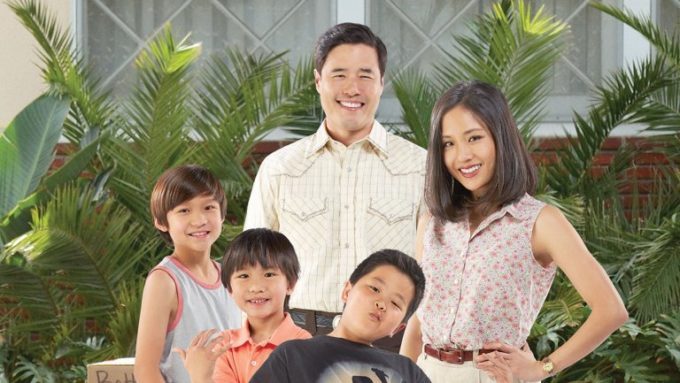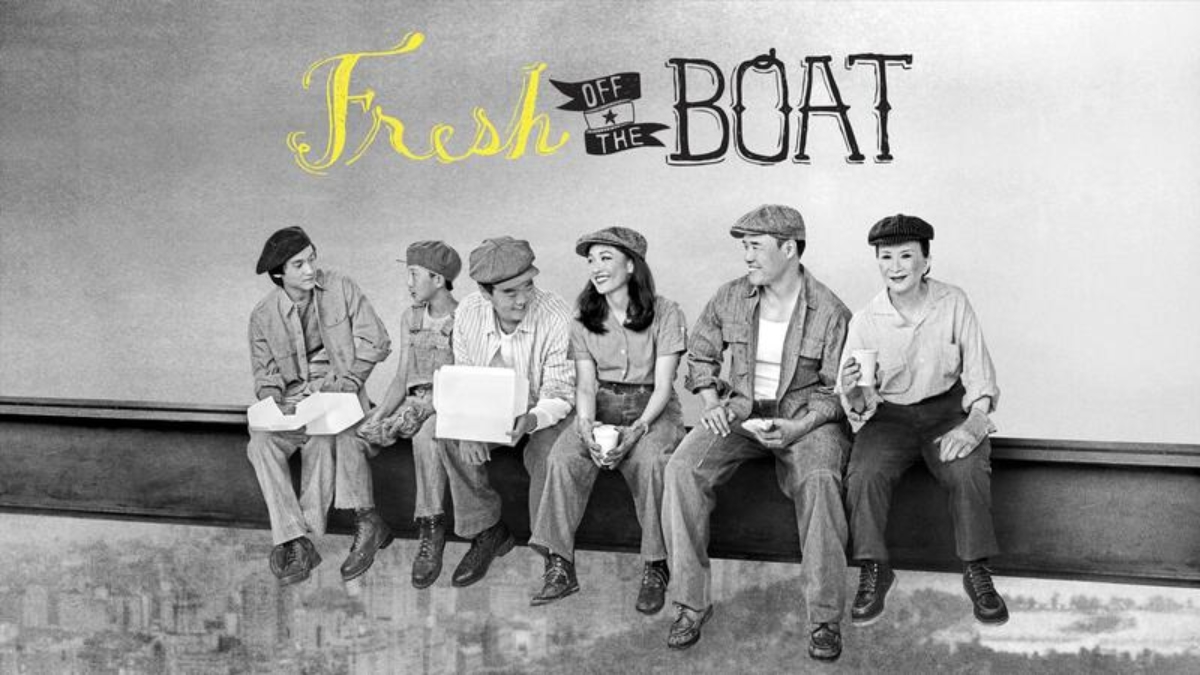Written By: Saiya Floyd
Looking back, the 2010s were a jolt of energy that catapulted Asian American media representation solidly into the mainstream. Of course there had been a few breakthrough stars before the 2010s, and a few movies and TV shows that featured an Asian protagonist, or even a predominantly Asian cast. And there have always been talented Asian artists creating work on the indie scene. But it was not until the 2010s that Asians and Asian Americans started to consistently get substantial or leading roles in major Hollywood productions. The 2010s changed that, and ABC’s “Fresh Off the Boat” which premiered in 2015 and will wrap up in winter 2020, is an integral part of this movement. It doesn’t start or end with “Fresh Off the Boat,” but it feels like the show bookends a specific phase of the Asian American representation movement.
Thanks to social media, activists and audiences started to come together and discuss representation issues in mass media, and in the mid-2010s, these discussions started to gain momentum. 2015 was the year April Reign first tweeted #OscarsSoWhite, a hashtag that has been used every year since, especially around peak awards season. #OscarsSoWhite remains one of the best known online campaigns that called for more diversity in Hollywood.
Within this larger social movement highlighting the lack of diversity in mainstream media, Asian American commentators began to form their own subcommunity. “Fresh Off the Boat” seemed perfectly timed. Announced in 2014, the show debuted in February 2015, as calls for diversity started to gain momentum. When it was time to promote the show, a lot of the buzz was around the fact that “Fresh Off the Boat” would be the the first network show since Margaret Cho’s 1994 “All American Girl” to center on an Asian American family.
Based off of Eddie Huang’s memoir of the same name, “Fresh Off the Boat” focuses on the Huang family when they move to Florida in the 1990s. As one of the most prominent shows about Asian Americans, there was a question of whether the show could not only provide representation, but also the kind of representation audiences craved.
In early interviews, Constance Wu (who plays Jessica Huang, the matriarch) discussed her character’s accent. She defended the choice in an interview with TIME, saying, “It’s just a fact of life: immigrants have accents. Making the choice to have that is a way of not watering down the character and making it politically correct. It’s choosing authenticity over safety, and I think that’s bold.”

Authenticity was the subject of the show’s first big controversy, when Eddie Huang himself outspokenly criticized the show based on his own memoir. He said after the show, he did not recognize the story being told. He was very vocal about his misgivings about a network show that was “the one-size-fits-all antithesis” of his book, taking to Twitter to air his grievances with the show. He even took the extraordinary step of writing an op ed for the New Yorker, where he slammed executive producer Melvin Mar and showrunner Nahnatchka Khan. The brutally honest piece detailed Huang’s apprehensions and issues with the series, and it was published before “Fresh Off the Boat” even aired its pilot episode. (Despite his criticisms, Huang still provided voiceover for the first season).
Huang criticized ABC for chasing a universal demographic that doesn’t exist. He went on to say, “People watching these channels have never seen us, and the network’s approach to pacifying them is to say we’re all the same.” He did concede “We are culturally destitute in America, and this is our ground zero.” Huang seemed to have cynically touched on a truth: with Asian Americans starving for representation, many audience members were so thrilled for any representation at all. As the first show in twenty years to revolve around an Asian American family, naturally Asian Americans wanted to see themselves and their experiences represented. How could “Fresh Off the Boat” appeal to both broad audiences while also speaking to the individual experiences of a diverse group?
For “Fresh Off the Boat” to work for ABC’s lineup, it had to be Asian, but not too Asian. The show did an admirable job of this, balancing traditional American sitcom stories with cultural specific storyline and gags. It took the usual ABC family sitcom format and infused it with just enough Asian Americanness that it felt fresh, but approachable for its average audience member. It seemed to work. It got good reviews (with a Metacritic rating of 75) and debuted to 7.94 million viewers.
And yet, when the second season of “Fresh Off the Boat” debuted, the biggest talk around the show was Huang’s departure from it. The show was unable to sustain the buzz it generated when it first debuted. (The spikes in interest in the chart correspond with spikes in interest in leading lady Constance Wu — when she starred in “Crazy Rich Asians,” and when she caused a minor brouhaha by tweeting her disappointment that “Fresh Off the Boat” had been renewed for another season).
So what changed? Arguably, the Asian American community’s relationship with media representation. In just a few years, Asian Americans started to lead more TV and films. Instead of being grateful for the powers that be to make a little space for them, the community started to expect — if not demand — a regular seat at the table. In “Fresh Off the Boat”’s lifetime, AA representation has shown it’s not just a trend, and it’s here to stay. But that wasn’t always a given.
Before “Fresh Off the Boat”, there was another network sitcom featuring an Asian family: “All-American Girl” debuted in 1994, and was cancelled after one season. Since then, Hollywood’s conventional wisdom held that Asian American centric shows weren’t profitable. It took 20 years for the community to get another chance on broadcast television. This isn’t an isolated pattern. When an action movie starring a woman flops, suddenly it’s “common knowledge” women-led action features aren’t viable. (When “Wonder Woman” and “Captain Marvel” premiered in 2017 and 2019, they were closely watched last they repeat the box office performances of “Catwoman” or “Elektra”). When an underrepresented group is given a starring vehicle, there is a lot of pressure for that vehicle to perform well, and the standards of success are often much higher.
Under these conditions, of course a lot of attention was put on “Fresh Off the Boat” to not just do well, but to excel. In many Asian American groups online, the mentality was “make sure this isn’t a flop or we might not get another shot for 20 years”.

“Fresh Off the Boat” didn’t flop. It did well enough to run for six seasons. And Asian American representation continued to grow. “Fresh Off the Boat” arguably helped by catapulting the careers of some of its associated talents — Constance Wu, Randall Park, and Ali Wong. Wu was relatively unknown before being cast, and was arguably the show’s breakout star. Her acclaimed run as Jessica would open new doors for her, including being cast as the lead in “Crazy Rich Asians,” another huge landmark of this era in Asian American representation.
Park, who had a fairly steady career before “Fresh Off the Boat” continued to gain work, in more and more high profile projects. His turn as Louis seemed to solidify his reputation of being a reliably likeable everyman. He was cast in a supporting role in the Marvel Cinematic Universe, one of the largest film franchises in the world. He also notably starred as the romantic lead in the 2019 romantic comedy “Always Be My Maybe.” The film was a showcase of “Fresh Off the Boat” alumni talent: it was directed by showrunner Khan, and co-written by Park and comedian Ali Wong — who wrote for “Fresh Off the Boat”. Wong has also had two successful Netflix stand up specials, a critically acclaimed book, and has subsequently been cast in several major projects.
Wong’s involvement highlights another legacy of “Fresh Off the Boat” — the doors it opened for for people beyond just the faces it featured on screen. By itself, the series could never cover the wide range of experiences Asian and Asian Americans in this country go through. In fact, while the 2010s were very important to opening the door to more Asian representation in American media, this representation had a tendency to be limited. As VICE pointed out, “Asian representation” tends to mean “East Asian representation”.
Five years ago, these kinds of conversations were not happening at such a broad level. Audiences were starved for representation — any representation — that there was pressure to support an Asian led project. But 2020 is a new decade. A new era. We still have work to do with getting diversity on screen, but it feels like in 2020, audiences have something 2015 audiences didn’t: options. With more and more diverse projects, speaking to different niches within the larger demographic, there is less pressure to support every Asian led project, and the room to stand up and demand more.
With the pressure lifted from “Fresh Off the Boat” as the most prominent example of Asian American representation, it can stand alone and be judged for what it is: a network family sitcom. The fluctuations of “Fresh Off the Boat” are in line with other comparable ABC shows. “Modern Family” has been its flagship sitcom for years, and in the earlier part of its run, was a frequent awards show contender. “Black-ish” had the benefit of featuring talent (Lawrence Fishburne and Anthony Anderson) that were already famous and familiar figures to its audience, and then launching several spin-off shows.
“Fresh Off the Boat” didn’t become a major awards contender, or “must see TV,” but in fairness, “must see TV” seems to be a less and less relevant title. 2019 continued an era of peak television, with the number of scripted programs projected to pass 500 for the first time ever. Network TV has to compete with cable shows, Netflix, Hulu, Disney+, Apple TV+, and whatever new platform we’re all expected to subscribe to. It’s a crowded landscape, and one that sometimes relies on a show finding a small but fiercely devoted audience. When you have 499 other shows to compete with, your show has to stand out and offer something unique. There is the increasingly rare breakthrough show like “Game of Thrones” that crosses demographics and yields a large, international following, but that is the exception rather than the rule. A network show designed to appeal to everyone will have a harder time breaking through
When it concludes its run, “Fresh Off the Boat” will have aired for six seasons, and passed 100 episodes — a gold standard in network sitcoms. It outlasted many other sitcoms, and has been nominated for some major awards. “Fresh Off the Boat” helped prove there is a demand for Asian American stories. Its legacy is showing an Asian American family as an average American family, while still honoring their roots and culture. And it is still helping to open doors. Randall Park has launched a production company that will focus on diverse voices in comedy. And “Fresh Off the Boat” announced a potential spin off featuring a South Asian family. These are all legacies “Fresh Off the Boat” should be proud of.
The series finale airs on Friday, February 21st at 8pm on ABC.

